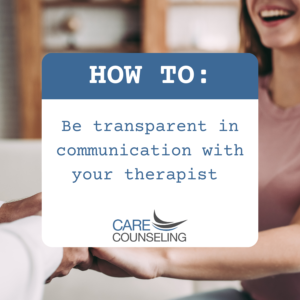 Congratulations! You have decided to take the first step and seek out therapy. You are excited (but also nervous) to meet with someone new. Perhaps you know a bit about your therapist after reading their profile. Maybe you don’t know much more than their name as you are hoping to be seen by the first available provider who will be a good fit for what you mentioned as your reasons for calling.
Congratulations! You have decided to take the first step and seek out therapy. You are excited (but also nervous) to meet with someone new. Perhaps you know a bit about your therapist after reading their profile. Maybe you don’t know much more than their name as you are hoping to be seen by the first available provider who will be a good fit for what you mentioned as your reasons for calling.
While there are a number of things to be aware of as signs of a good therapist, one important aspect is that they actually listen to you. This looks like feeling seen, heard, and understood. You feel validated and develop a good rapport to where you can feel comfortable sharing with your therapist. You can build on a foundation of trust where you feel safe to be yourself, free without judgment. There is mutual respect, and you genuinely feel that your therapist cares.
In addition to being a good listener, your therapist is good at communication. They can help “circle back” to topics and themes and check in on what you need. The therapist may take on various roles, ally, educator, collaborator of change, accountability partner, etc. While there are common foundation elements for therapists, the personalities, identities, lived experiences, and modalities will differ.
Mental health presentations and life experiences can impact rapport and trust, especially if establishing trust has been difficult. Some clients may take a while to warm up for therapy. You may find yourself guarded. If therapy was not your choice, there may be disengagement or resistance. Therapy (and therapists) may be different from what you expected. When what you are seeking is very different from what is received, you may find yourself feeling upset, disappointed, or frustrated.
Clients are encouraged to be transparent in communicating their needs and preferences throughout treatment. After the first five sessions, you will begin to have an idea of what therapy will be like. That is a great time to check in with your therapist and share your experience thus far. Within the first 3-months, most clients are going to see positive change and progress toward goals.
If you are unsure about your therapist after the first few sessions, consider asking yourself if there is potential for the relationship to be helpful. Perhaps the first person you meet will not feel like the “perfect fit”. For example, they may be younger or older than you expected. Is there something of value that you could learn from the therapeutic relationship and about yourself? There are many potential options in these situations and communicating with your therapist is ideal to help ensure the best possible outcome.
What do you do now? Give it another try? Wait and see how things work out. Consider transferring to a different therapist.
Ghost your therapist? Go online and cancel all your appointments.
I want to propose an alternative. What would it look like to be transparent and communicate with your therapist? This takes courage and is not the easiest option, but it can be an incredible growth experience!
- Talk about your previous experiences with therapy and what you are seeking currently.
- Share what is helpful and what is unhelpful.
- Ask questions that will help you feel comfortable working with someone new.
- Communicate your needs and preferences throughout treatment.
- Consider reevaluating options and discussing these with your therapist if you are not benefiting from therapy.
- Share your thoughts/ feelings related to what was done in the session and what you’d like to focus on next.
Written By: Charlotte Johnson, MA, LPCC
We’re Here to help
Our wellness experts will be happy to take care of you. You can CLICK HERE to schedule an appointment now or call (612)223-8898.
Meet Clinicians
We’re united by our commitment to providing effective, relevant, and innovative mental health support at all stages of your journey. Click Here to find a therapist or find out more about who we are, where we come from, and how we live out CARE’s mission every day.
The professionals at CARE are actively collecting and creating resources to help with what you need and address frequently asked questions. We’re Here for You.



